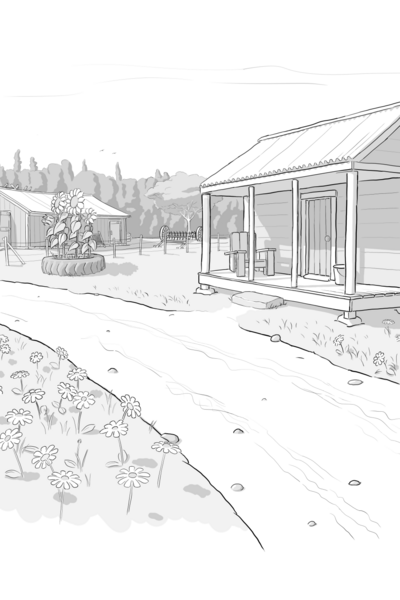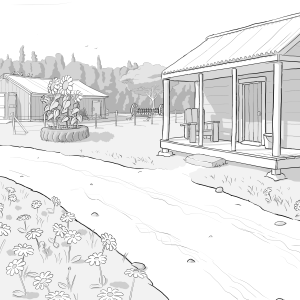Epilogue: Letter from Heinz Futz to Giesel Alieu (Nee Von Kleinbaum), August 1988.
Dear Frau Alieu,
This letter will be a surprise to you, and probably an unwelcome one, as is any reminder of the war. You were a baby, or perhaps not yet born at the time, and like all of us, you would prefer to forget your connection with these events, however I feel it is important that you learn the truth, as I recently have, about your father, under whom I served from March to September of 1943.
Firstly, I must tell you that your father did not shoot himself, and that the suicide note your mother was given was a fabrication. Having recently traveled to Russia to investigate, I can tell you with certainty that the note, as convincing as it must have been, was the work of army forgers (who had at their disposal a large stock of real letters to suit any circumstance). I know this to be true, because I am one of the few men who saw what your father really wrote.
Although your father’s true note remains enigmatic, my recent travels have confirmed, to me, its veracity, and shed light on the events of this confusing time. The letter was quickly destroyed, and I only glimpsed it once, however it was short, and unforgettable, and I will stake my honor on its accuracy. However it begs explanation, which I feel obliged to provide. My understanding of what happened is incomplete, so I will begin by recounting what I myself saw.
We had occupied a small town as part of a planned stand against a massive Soviet offensive. In the course of our preparations, we were inconvenienced by some theft and minor acts of sabotage, however I am not aware that we made any response until the tires of several vehicles were slashed.
Several men were taken into custody, and brought to our headquarters (in a local school building) for questioning by your father. I was one of two officers tasked with standing guard outside. The subjects were questioned one at a time, and then sent outside for me to watch over. As each man was handed off to me, I was instructed to fire my rifle into the ground to make it make it appear we were killing them.
By the time the last man was interrogated, it had been determined that there were partisans hiding in the woods. A squad was ordered to find and pacify them, and I saw them drive off. After a few minutes, your father walked out of the building. I asked him what we were to do with our detainees, and he said “send them home”, and then he walked off. I never saw what happened to the last man.
The following morning, when I went to report to your father, he was gone, and on his desk was a sheet of paper weighed down by a Gold eagle.
I had only shown the note to a few men, before a political officer saw it. He quickly pocketed it, and then ordered us back to our posts. The man was good at his job, and within a half hour, we were told the story of your father’s suicide, but news of your father’s odd proclamation had already spread.
None of us knew the truth, but your father’s letter was of such a nature that the mere fact of knowing it’s contents was considered to have rendered us an unreliable fighting unit. We were ordered away from the front, and our sector was presumably filled by the SS units that flanked us on each side.
That we were flanked by SS units was no coincidence. Your father was the most capable field commander I have known of, and the army could not afford to sideline him despite any misgivings. Your father once commented that we were always accompanied by SS units because the army doubted that he would fight. “They don’t know me”, he said. But it seems they knew something after all.
I was told the suicide story so many times that I began to doubt what I had seen, however the strangeness of events, as well as their strategic importance kept the matter in my mind as the years passed. The recent easing of tensions and of travel restrictions coincided well with my retirement, and at the urging of a cousin in the East, I planned a trip that would bring me to several towns, and finally to the Archive of the Great Patriotic War, where I was to record a video testimonial.
I spent four days in the town where I last saw your father, and I spoke with many of the older natives, who were both friendly and helpful, in the hope that I might learn of his fate. I was able to confirm that the adjacent SS units had, indeed, occupied the town after our withdrawal, however it was not until I interviewed a woman who had been the school librarian that I found any clue to what had become of our captain.
The woman was in her nineties, but lucid. Considering the suffering we had inflicted on her country, it is odd how ashamed she made me feel for the mess we had made of her shelves.
“You just pushed the shelves to the wall, and piled books at random in the corners”, she scolded me. “And worst of all, you left a man locked in my closet!”
This had been the last man we interrogated on that penultimate day. The librarian informed me that he had died not long after, and so there was no way to learn what had happened in that room to break your father’s fighting resolve. I asked if the prisoner had been hurt, or if he had said anything to provide a clue.
“He never said a word” the woman told me. “He wasn’t physically hurt, but he was like a ghost. He had peed all over the Great Soviet Encyclopedia. If a portal to paradise had opened in the back of my closet, he wouldn’t have bothered to go through. The only reason he left is that it was easier to do than to stay.”
Although that man man left only an enigma, the librarian did provide one bit of information that gave final confirmation to the truth of your father’s letter. She told me that a group of Germans dressed as peasants had been found executed, near the bank of the river several miles to the South. She knew of this because one of her library books had been recovered from the bodies. An atlas and travel guide to the Near East, Egypt and the Horn of Africa. Inside this book, she had found part of a German military map.
The bodies had been those of your father and his closest comrades. What they were doing there will be made clear by the contents of the letter I had found when I reported for duty at daybreak, and which I will now disclose. It read, simply:
“I can no longer participate in this endeavor. I and my officers are going to Madagascar to take native wives and live as fishermen.”
He must have been found and executed by an SS patrol. He should have crossed the river to the forested far side before heading South, but he had ordered the bridge to be dynamited two days earlier. I wish I could tell you that your father made it to Madagascar, but though it is sad he did not live, I hope at least that you will be comforted by the knowledge of his fate. As honorable an end as an officer of the Wehrmacht can have had in that campaign.
I must also comment on the seeming betrayal of you and your mother that is implicit in your father’s final note. I prefer to interpret this seemingly wanton abandonment as an attempt to spare you from reprisals.
And so, with the facts at last confirmed, I traveled to Moscow to record my testimonial at the archive. This was, as I had expected, a solemn event, and it was only there, standing before a monumental statue to general Zhukov that my thoughts returned to the man in the closet.
Zhukov is given credit for the great victory that followed your father’s desertion. All acknowledge his greatness as a leader and as a strategist, but I, who understand the disposition of forces before the battle as well as any man alive, am not so certain.
I hesitate to say these things for fear of arousing an old and shameful pride, but it seems a simple truth that if our brigade, led by your father, had been at our stations, then the Soviets would not have crossed the river when they did. I estimate that your father’s desertion advanced the timetable of our defeat by weeks. Weeks, when each day of victory only bought us greater infamy, is no small matter.
What can have happened in that library? If one did not know your father, one might surmise that he had been moved by pity. I cannot bring myself to accept this explanation. He was certainly a man of honor, and he tried at all times to be the liberator that our propaganda proclaimed us to be, but he had seen so much worse. Much worse, and he had never faltered.
I wish I had asked more about the man in the closet, but the librarian was frail, and I felt there was little to be learned, so I learned only a little. I learned that he was a carpenter who spent much of his time walking about and drawing in a small notepad. I learned, also, that he was a veteran of the first war, but the librarian spoke of this service with contempt. Apparently the townspeople had learned from a passing soldier that he had been injured in a carpentry mishap.
“He was badly scarred” she told me. “but they weren’t battle scars, they were his own incompetence”
“So he was living in shame?” I asked her
“No.” she replied. “We all laughed privately when he strutted around bare chested, but he had a popular friend who would have beaten anyone that dared to malign him publicly”.
It seems the carpenter was never aware that the townspeople knew the truth of his war service, and according to the librarian, he was not at the top of his craft either. She did mention that there was a chair he had built on her front porch, and I looked for it on my way out. I did see a chair, but it cannot have been the work of even a mediocre carpenter. To all appearances, this man was unpopular, unskilled, and cowardly, so it is strange that he came to mind as I stood before the general’s monument.
And so that is the story of your father’s war service as far as anyone will ever know. My life, since the morning I discovered his note, has been nothing short of blessed. Along with the rest of our brigade, I spent the remainder of the war doing flood mitigation work outside of Duseldorf, which is where I met my wife. But though I dearly love my Ilsa, and our two daughters and our grandchildren, I will tell you that one of my most serious regrets is that your father did not ask me to join him. I had only been with the company for three months, and though attachments form fast under such circumstances, I suppose that your father dared not involve any new officers in his desertion. But had he asked, even knowing what I now know, I cannot but have said yes.
Though I only knew your father for a short while, it is more time than you had. From what I know and what I can surmise, you missed-out on a lot, and I am at your call should you have any questions. I hope that this letter finds you and your family well, and that it helps in some way.
Yours Truly,
Heinz











Comments (0)
See all